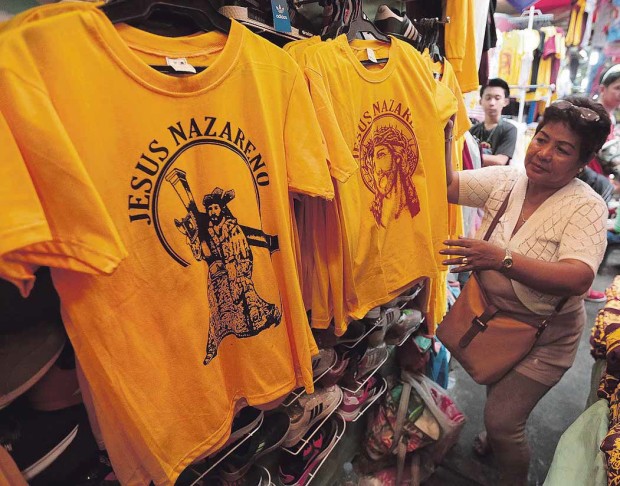
BUSINESS SENSE Lisa Isangga, 62, enjoys brisk sales of T-shirts every Feast of the Black Nazarene in Quiapo, Manila. The shirts are sold for P150 apiece. GRIG C.MONTEGRANDE
The Metropolitan Manila Development Authority (MMDA) is considering banning ambulant vendors from Manila’s Quirino Grandstand during the Feast of the Black Nazarene next year.
Francis Martinez, head of MMDA’s Metro Parkway Clearing Group, said the group may again limit vendors to only along Roxas Boulevard as this measure proved effective in reducing the volume of garbage strewn in the area.
He noted that the trash that the MMDA collected at Quirino Grandstand and in Quiapo totaled 202 tons (equivalent to 34 trucks), eight tons lower than the volume last year.
Procession ‘quicker’
Martinez said the restriction also allowed the procession on Monday in Manila to move faster than usual because of the absence of injury-causing garbage, such as barbecue sticks.
He observed that there were no reports of devotees getting injured by wood splinters as the carriage of the Black Nazarene made its way out of Quirino Grandstand.
The MMDA said the garbage it collected consisted mainly of plastic bottles, candy wrappers, plastic bags and spoiled food.
Martinez appealed to devotees not to bring highly perishable food when queuing for the traditional pahalik (touching and kissing of the image of the Black Nazarene) to avoid spoilage.
For vendors, the Feast of the Black Nazarene is a time to sell goods and a time to show their devotion.
Vendor-devotee
Not only devotion but also business sense is passed on to the next generation, as men, women and their children come together to sell merchandise like shirts and towels bearing the image of the Black Nazarene and other souvenirs.
Marian Samson, 37, said sales were slower this year, perhaps because of stiffer competition.
Samson is a devotee of the Black Nazarene, something that she got from her husband, who braved crowds to hold the thick rope pulling the carriage bearing the Black Nazarene. He died in April last year.
“I’ve been selling during the feast for three years now. I’m continuing it for my husband,” she told the Inquirer. “My prayer to the Nazareno is to guide me now that I am all alone in raising our two children.”
Security and safety were the prime concern of Carmelita Ocampo, also a vendor, who lives in Tondo—a place notorious for many deaths and arrests under the Duterte administration’s war on illegal drugs.
Ocampo, 37, said her brother Jimmy and his wife were recently thrown behind bars for illegal drugs.
“But they are not drug users. They just got rounded up along with the other suspects that the police killed,” she said.
Ocampo said her sibling urged her to come to Quiapo Church and sell towels for extra income. She brought along her daughter.
Thirteen-year-old Ramon (not his real name) came with his cousins, some younger than he, to sell bottled water, cigarettes and candy to the million-strong crowd.
They have been going to the feast since 2013, peddling goods.
Fr. Douglas Badong, parochial vicar of the Minor Basilica of the Black Nazarene, has appealed to devotees not to become “seasonal” Christians but to be examples of Christ.
Lack of discipline
Badong said he noticed on Monday that several devotees left their trash behind and “lacked discipline” during the 22-hour procession to Quiapo Church.
He noted that some of the younger devotees were shoving their fellow devotees to the point of almost punching them just to get near the carriage of the image of the cross-bearing Christ.
“That’s not what Christ wants. There’s a contradiction [between the devotion being shown and actions being done],” he said.
‘Good job’
Malacañang on Tuesday congratulated organizers and concerned government agencies for keeping safe millions of devotees of the Black Nazarene on Monday.
Despite the procession of the image lasting for nearly a day and attracting hordes of the faithful, there were no untoward incidents, according to Presidential Communications Secretary Martin Andanar.
Andanar also noted that there were no reports of petty crimes during the procession.
He said the celebration of the feast was orderly and peaceful. “Good job to everyone,” he said.
Amid reports that a tarpaulin at Quiapo Church reminded the faithful that they should not kill, Andanar said Church officials had the right to post whatever they wanted on church walls.
Some of the devotees who joined the procession sent a clear message against extrajudicial killings, which have been on the rise amid the crackdown on the illegal drug trade. —WITH A REPORT FROM LEILA B. SALAVERRIA